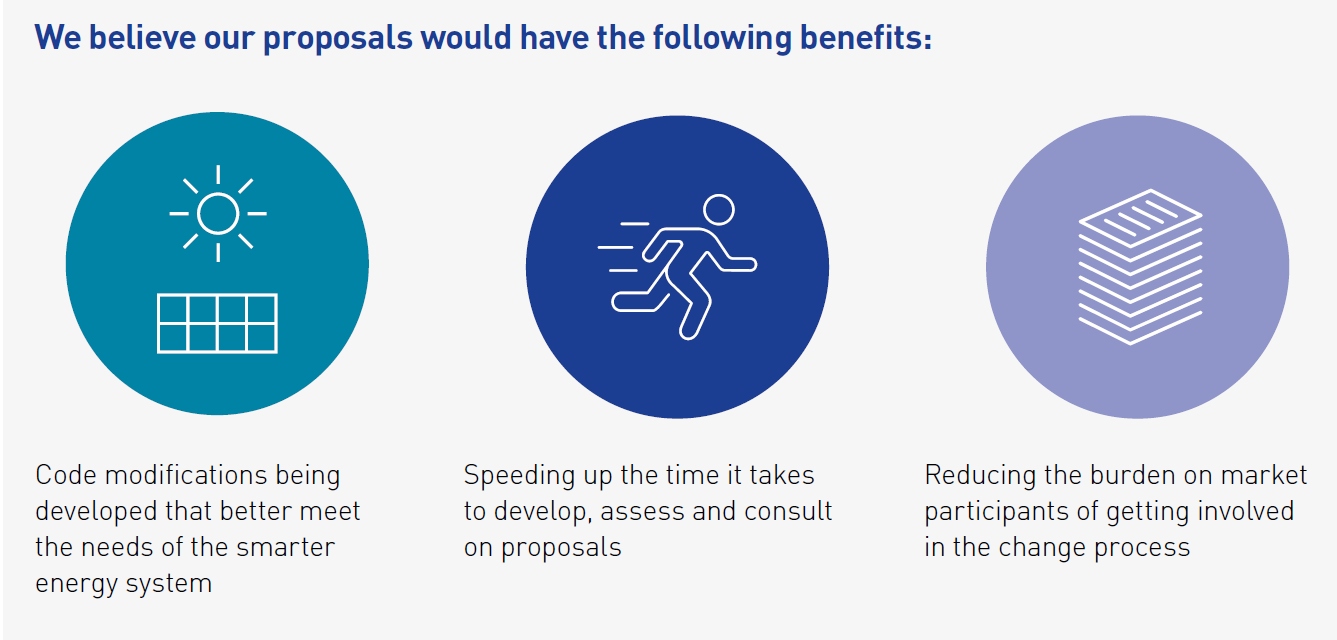BSC Insights: How we can streamline the Modification Process
Published: November 2019
Based on our latest Policy View, Elexon could deliver ‘quick wins’ to bring about a faster, more consistent process for making changes to the 11 energy industry codes.
The benefits include speeding up the time it takes to change code rules and reducing the burden on market participants that get involved in the change process.
Ofgem could encourage energy companies to raise the requests needed to put the proposals into action across all of the codes.
Proposed changes
Elexon has proposed the following changes for all the energy codes:
- A maximum of two solutions to be put forward for each proposed rule change.
- Reason: The BSC only allows two solutions to be put forward but in other codes multiple variations are allowed and in one case 80 alternatives were put forward. A limit of two solutions would save time and resources.
- Industry workgroups are only to be convened following initial development of a change proposal by the code administrator.
- Reason: This would save time when the proposed solution is debated by the workgroup, ensuring that resources of industry experts and code administrators are used more efficiently
- Codes should have an ‘Issues’ process to allow problems or solutions to be considered before formal change proposals are launched.
- Reason: Elexon successfully used this earlier in 2019 to deliver a solution in under two months to fund operational costs for the radio teleswitch service under the BSC (without having to use the formal rule change process). Where beneficial, all codes administrators should be able to use a similar process as it can speed up changes.
- All code managers to aim to only consult once on rule change proposals.
- Reason: In several cases, including the BSC, code managers have to consult more than once, which slows down the change process.
- All code panel members to act independently.
- Reason: BSC Panel members have a duty to act impartially and must give an undertaking to do so before being appointed. This is not the case across all the codes and some panels could be viewed as less independent than the BSC.
- Major change proposals to be broken down into ‘control gates’ where Ofgem says whether the change could be accepted or not.
- Reason: This would avoid situations where the industry develops proposals over a long time period, which could never have been approved by Ofgem. It will also reduce instances where Ofgem ‘sends back’ a proposal to the industry so that it can be reworked.
Download the Policy View: A faster, more consistent process for changing energy codes
Speeding up the change process
Elexon’s proposals would speed up the time it takes to consult on, and implement changes to energy code rules. They would make better use of the time and effort that industry parties spend on debating changes.
The proposals could be implemented before any wider, more fundamental reforms to the energy codes landscape are introduced, following the review by the Department for Business Energy and Industrial Strategy (BEIS) and Ofgem. Elexon’s proposals could therefore be viewed as ‘quick wins’.
How does the code change process work?
Elexon is the manager of the Balancing and Settlement Code (BSC) which ensures that payments for imbalances in wholesale electricity supply and demand are settled accurately. The remaining ten codes are managed by five other code administrators.
Under each code, major rule changes are debated by industry experts in workgroups before consultations on changes are issued to industry.
Change proposals are then brought before panels of industry representatives specific to each code. If the proposal is not commercially significant it can be decided on by these panels. If the proposal is likely to have a significant impact on consumers or energy companies, code panels make a recommendation to Ofgem which has the final decision on whether to agree a change.
It typically takes eight months for BSC rules changes to be developed and sent to Ofgem for a decision. The timescale is longer for some of the other codes.
How could the proposals be implemented?
The majority of Elexon’s proposals could be delivered by raising modifications to amend the relevant code governance arrangements. Changes in regulations or legislation would not be needed.
Currently, only energy companies that are signatories to the codes can raise modifications. It is possible that Ofgem could encourage such companies to table the necessary changes to enact the proposals across all of the codes.


